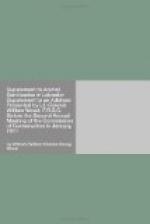The language should be unmistakeably plain. Every form of wild life should be included, as wholly, seasonally, locally or otherwise protected, or as not protected, or as exterminable, with penalties and rewards mentioned in each case. All animals should be called by their scientific, English, French, and special local names, to prevent the possibility of mistake or excuse. Every man, resident or not, who uses rod, gun, rifle, net or snare, afloat or ashore, should be obliged to take out a license, even in cases where it might be given gratis; and his receipt for it should contain his own acknowledgment that he has a copy of the laws, which he thoroughly understands. Particular clauses should be devoted to rapacious dealers who get collecting permits as scientific men, to poison, to shooting from power boats or with swivel guns, to that most diabolical engine of all murderers—the Maxim silencer,—to hounding and crusting, to egging and nefarious pluming, to illegal netting and cod-trapping, and last, but emphatically not least, to any and every form of wanton cruelty. The next step may be to provide against the misuse of aeroplanes.
I believe it would be well worth while, from every point of view, to publish the laws, or at all events a digest of them, in all the principal papers. Even educated people know little enough; and no one, even down the coast, at the trading posts, or in Newfoundland, should have the chance of pleading ignorance. “We don’t know no law here” ought to be an impossible saying two years hence. And we might remember that the Newfoundlanders who chiefly use it are really no worse than others, and quite as amenable to good laws impartially enforced. They have seen the necessity of laws at home, after depleting their salmon rivers, deer runs and seal floes to the danger point. And there is no reason to suppose that an excellent population in so many ways would be any harder to deal with in this one than the hordes of poachers and sham sportsmen much nearer home.
Of course, everything ultimately turns on the enforcement of the laws. And I still think that two naturalists and twenty men afloat and the same number ashore, with double these numbers when Hudson bay and the Arctic are included, would be enough to patrol Labrador satisfactorily, if they were in touch with local and leasehold wardens and with foresters, if the telegraph was used only on their side, if they and the general inspector were all of the right kind, and if the whole service was vigorously backed up at headquarters. Two fast motor cruisers and suitable means of making the land force also as mobile as possible are sine qua non.
The Ungava peninsula, Hudson bay and Arctic together would mean a million square miles for barely a hundred men. But, with close co-operation between sea and land, they could guard the sanctuaries as efficiently as private wardens guard leased limits, watch the outlets of the trade, and harry law-breakers in the intervening spaces. Of course, the system will never be complete till the law is enforced against both buyers and sellers in the market. But it is worth enforcing, worth it in every way. And the interest of the wild life growing on a million miles will soon pay the keep of the hundred men who guard its capital.




